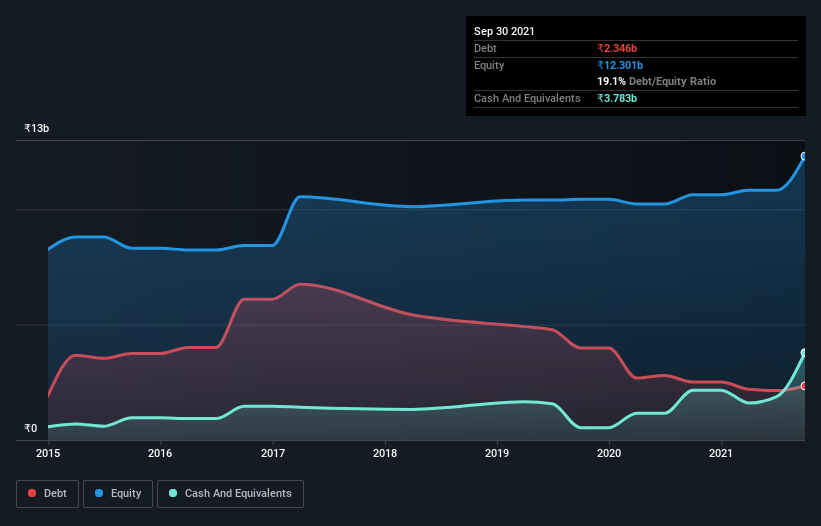- India
- /
- Marine and Shipping
- /
- NSEI:ORICONENT
Does Oricon Enterprises (NSE:ORICONENT) Have A Healthy Balance Sheet?

Some say volatility, rather than debt, is the best way to think about risk as an investor, but Warren Buffett famously said that 'Volatility is far from synonymous with risk.' When we think about how risky a company is, we always like to look at its use of debt, since debt overload can lead to ruin. As with many other companies Oricon Enterprises Limited (NSE:ORICONENT) makes use of debt. But the more important question is: how much risk is that debt creating?
When Is Debt A Problem?
Generally speaking, debt only becomes a real problem when a company can't easily pay it off, either by raising capital or with its own cash flow. Ultimately, if the company can't fulfill its legal obligations to repay debt, shareholders could walk away with nothing. While that is not too common, we often do see indebted companies permanently diluting shareholders because lenders force them to raise capital at a distressed price. Having said that, the most common situation is where a company manages its debt reasonably well - and to its own advantage. When we think about a company's use of debt, we first look at cash and debt together.
See our latest analysis for Oricon Enterprises
What Is Oricon Enterprises's Debt?
As you can see below, Oricon Enterprises had ₹2.35b of debt at September 2021, down from ₹2.51b a year prior. However, it does have ₹3.78b in cash offsetting this, leading to net cash of ₹1.44b.

How Healthy Is Oricon Enterprises' Balance Sheet?
According to the last reported balance sheet, Oricon Enterprises had liabilities of ₹2.81b due within 12 months, and liabilities of ₹995.4m due beyond 12 months. Offsetting this, it had ₹3.78b in cash and ₹1.48b in receivables that were due within 12 months. So it can boast ₹1.46b more liquid assets than total liabilities.
This surplus strongly suggests that Oricon Enterprises has a rock-solid balance sheet (and the debt is of no concern whatsoever). With this in mind one could posit that its balance sheet means the company is able to handle some adversity. Succinctly put, Oricon Enterprises boasts net cash, so it's fair to say it does not have a heavy debt load! The balance sheet is clearly the area to focus on when you are analysing debt. But you can't view debt in total isolation; since Oricon Enterprises will need earnings to service that debt. So if you're keen to discover more about its earnings, it might be worth checking out this graph of its long term earnings trend.
In the last year Oricon Enterprises's revenue was pretty flat, and it made a negative EBIT. While that hardly impresses, its not too bad either.
So How Risky Is Oricon Enterprises?
Although Oricon Enterprises had an earnings before interest and tax (EBIT) loss over the last twelve months, it made a statutory profit of ₹1.3b. So taking that on face value, and considering the cash, we don't think its very risky in the near term. We'll feel more comfortable with the stock once EBIT is positive, given the lacklustre revenue growth. When analysing debt levels, the balance sheet is the obvious place to start. However, not all investment risk resides within the balance sheet - far from it. Be aware that Oricon Enterprises is showing 3 warning signs in our investment analysis , you should know about...
At the end of the day, it's often better to focus on companies that are free from net debt. You can access our special list of such companies (all with a track record of profit growth). It's free.
New: AI Stock Screener & Alerts
Our new AI Stock Screener scans the market every day to uncover opportunities.
• Dividend Powerhouses (3%+ Yield)
• Undervalued Small Caps with Insider Buying
• High growth Tech and AI Companies
Or build your own from over 50 metrics.
This article by Simply Wall St is general in nature. We provide commentary based on historical data and analyst forecasts only using an unbiased methodology and our articles are not intended to be financial advice. It does not constitute a recommendation to buy or sell any stock, and does not take account of your objectives, or your financial situation. We aim to bring you long-term focused analysis driven by fundamental data. Note that our analysis may not factor in the latest price-sensitive company announcements or qualitative material. Simply Wall St has no position in any stocks mentioned.
Have feedback on this article? Concerned about the content? Get in touch with us directly. Alternatively, email editorial-team (at) simplywallst.com.
About NSEI:ORICONENT
Oricon Enterprises
Engages in manufacturing, trading, and sale of plastic closures and preforms in India and internationally.
Adequate balance sheet slight.
Market Insights
Community Narratives



